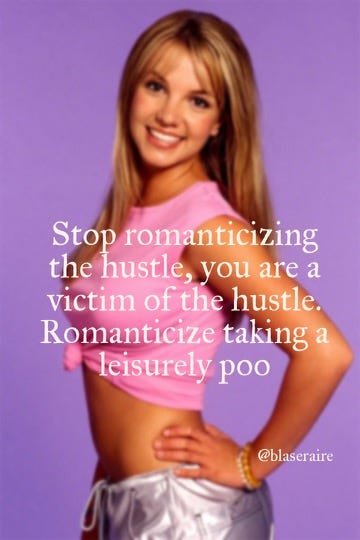Coming Home: How Both Men & Women Can Benefit from Valuing Domestic Labor
Unit 2: Modern Aesthetics of Gender Roles; Topic 2: Domestic Labor Equity Not Equality
Hello Angel,
A quick note on how to engage with this article.
1. Like a class curriculum, each topic is part of a larger unit that dives into a distinct subject. Think of it like a vinyl record, each topic can be enjoyed as a track or fully experienced like an album. Subscribe to get them weekly in your inbox!
2. No knowledge gatekeeping here! We’re neophytes ourselves, presenting our laywomen’s research from topics that make us curious. If you see a bolded term, it is defined in the glossary at the end of this article.
3. Look out for underlined passages, these are your portal down the knowledge rabbit hole and lead to further reading. Insatiable? Original sources are merchandised on our interactive reference page at the end.
4. This is a *reciprocal* experience! We invite you to contemplate the discussion questions at the back. Or even cooler, forward the topic to a friend, colleague, or your crush and start a meaningful conversation.
Curiously,
Ambi & Abbey
ICYMI, internet trends for Gen Z and millennial women have been ditching the corporate ladder climb #girlboss fantasy for the escapism of rural home and hearth.
Cottage core trends subvert pastoral, Victorian, and pre-industrial fashions and emphasize slow living. The Stay-At-Home Girlfriend internet phenom also embraces a kind of modern slow-living, albeit less imaginatively.
These internet trends appeal to more than just women, the influence appeal of these trends underscores a resistance to the productivity treadmill.
As we all look for things like purpose, connection, and fulfillment, we need equity not equality of labor. There is a modern awareness that while there have been more “opportunities” for women, they are often under the guise, not the true actualization of empowerment.
Same same but different: equity vs. equality
bell hooks calls modern feminism, “the patriarchy in drag”, denoting how the sexes are in need of equity, not equality. Patriarchy is a polarizing word and does not seem to acknowledge that men are also victims of this societal narrative. We are human beings, but our money-crazed society would have us believe we are human doings.
This transactional exchange of labor has been fueled by propaganda that to be a man is to “provide”, earnings being a way to track success. Poverty thus becomes emasculating, on top of the other stressors of lacking income.
We have expelled the feminine side, the balance of archetypal roles of softness, slowness, intention, and enjoyment. There is no question as to whether masculine traits, such as strength, leadership, and assertiveness are beneficial. Surely we can see the fruits of their expression. But to rid society of an entire array of complimentary traits, ie. feminine qualities, is to sever a limb from the wholeness of its being.
We can see this in action when comparing some core stats. Men are more than three times more likely to commit suicide than women. In the education sphere, men have accounted for 71% of enrollment decline over the last five years, and women have accounted for more than 50% of degree holders over the last 20 years now.
While there can be a number of reasons why, such as income and familial support, it’s almost impossible to not see the collective sentiment towards men having to be strong, bearing, and persevering having worn down their motivation. How can one stay committed when they are cut off from an entire element of their soul? The part of them that seeks softness, emotionality vulnerability, and understanding in everyday life?
Many who backlash against the aestheticization of homemaking in the name of “feminism” fail to note the resistance that underscores and always has underscored domestic work.
There is a desire amongst both genders, yet we more commonly see privileged women are at liberty to lavish advantage of the longing to not engage with patriarchal and capitalist demands, whereas, for men, this choice is to make under the peering eyes of society. For those who cannot afford to opt out of the workforce, it is not a choice altogether. While distracting & often misguided, this is how the patriarchal narrative serves the profit motive.
The girl boss is tired - and so is the boy boss
Chloe Madison, renowned agency and clothing label founder, mentions on an Unhinged podcast, she’s tired. She looks at the women heading to Erewhon in the middle of the day, keeping their homes tidy, and thinks, “Did I make a mistake?” A question that many of us “girl bosses” are likely all too familiar with.
These trends say “I have options and I am choosing one that is fulfilling to me, even though it doesn’t bring as much social or economic capital.” Of course, we must acknowledge that the operative of this statement is “I have options” as these trends are mainly accessible and marketed to privileged white women who are able to opt in or out of the workforce.
However, these trends can have implications outside the walls of the home if we acknowledge them as an act of resistance to capitalist demands in a post-AI society.
We see countless inspirational displays of single men, single women, and entire families heading off the grid. It’s possible that we are not witnessing a gendered desire, but instead, a longing for balance, richness, and satisfaction that is not quite tangible in the single currency arrangement we operate within the modern world, ie. I do work that is deemed worthy of money and you pay me.
Money Don’t Buy You Love - Or a Home-Cooked Meal
The urgency of celebrating this domestic labor seems most pressing in times of crisis, as we saw in 2020 which birthed the revival of the modern cottage core trend. Looming population declines, resource scarcity, and AI automation are all societal challenges that would force us to value domestic labor such as elder care, gardening, cooking, and slow living.
For working women and working men, valuing domestic labor means breaking the money paradigm that tells us everything has a market value.
But in a time of crisis when that value could not actually be seen or felt, like COVID-19, we got a glimpse into other currencies that our souls potentially have a hunger for. Another source of reward for the outputs of our human beings…not our human doing.
Understanding the invisible labor that goes unremunerated, reducing the stigma around those tasks, and embracing them for the non-monetary fruits that they bear will bring relief to both genders*. Seeing how the “seemingly” encoded desires of both genders have more overlap than difference can help us find a middle ground where the fringes of differences can be used as complimentary strengths rather than blinding differences.
As we strive for equity in the home, allowing hetero men to de-stigmatize softness and embrace domestic labor can provide an outlet for a society that asks us to constantly conquer. These tasks stand as a metaphor for the desires for nurturance, gentleness, warmth, and expressiveness are yearnings that we all share. They welcome us home to the totality of ourselves.
Home Sweet Home
The innate desire in us all for empathy and tenderness also can be embraced by the workplace, making an ecosystem where no one is asked to deny parts of themselves, but have an opportunity to embrace all facets, to see the reflection of all traits to the extent at which they desire.
The home is a space of community, creation, nourishment, comfort, and escapism.
If we can sustain ourselves at home where love and connection are the currency and even find fulfillment in spaces where money is the dominant currency, perhaps we can imagine alternative ways of living and maybe even stop the treadmill altogether.
*We support the full gender spectrum. We use “both genders” in this piece to refer to the traditional roles surrounding the masculine and feminine archetypes.
Discussion Questions:
How do societal expectations of gender roles and the valuation of domestic labor contribute to the broader issue of income inequality?
In what ways can the current trend towards slow living and domesticity be seen as an act of resistance to capitalist demands?
How can we work towards a more equitable society that values all forms of labor, not just those that are monetarily compensated?
Glossary:
Patriarchy: A social system in which men hold primary power and authority.
Capitalism: an economic system with the goal of generating profit. It is characterized by a free market, competition, and the exchange of goods and services for money.
Remuneration: Monetary payment or compensation for work or services rendered.
Cottage core: A design aesthetic that romanticizes rural living, often incorporating elements of the pastoral and pre-industrial eras. Read more about it here.
Stay-At-Home Girlfriend: An internet trend of women documenting their point of view staying at home while their partner leaves for the day to provide monetarily. Read more about it here.




